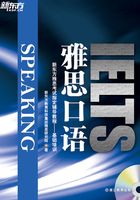
Speaking Unit 3 Sport and Exercise
Focus on Part 1 of the IELTS Speaking Test
WARM-UP
 1. Listen and repeat the sentences below.
1. Listen and repeat the sentences below.
a. I play basketball with my friends every day after school.
b. I’m not very good at soccer but I love it.
c. In my free time, I often like watching tennis matches on television.
d. I don’t watch rugby very much because it’s not very popular in China.
e. On the weekends, I play table tennis with my dad.
VOCABULARY
2. Look at the following sports.Can you add any more to the list?
hockey soccer rugby athletics gymnastics volleyball table tennis swimming golf American football basketball cycling skiing snowboarding skating kayaking tennis weightlifting squash surf ing boxing motor racing badminton show jumping snooker sailing
3. Classify the sports into the following four categories:

There are usually three verbs which go together with various sports:
play, go and do.
For example:
I go surfing (only used with + - ing)
He plays basketball (sports with no –ing ending)
We use the verb do with the following sports: athletics, gymnastics.
Tip:
‘play’ is often associated with a sport that uses a ball
‘go’ often means there is no set area in which the sportsperson has to move (freedom to move anywhere)
‘do’ has the sense of confinement. e.g. a stage, a ring, an arena
4. Match the sports from Activity 2 with the appropriate verb.

5. Write five sentences about yourself using the vocabulary you have learned so far.
6. Say your sentences to a partner.
7. Make questions for your partner using the prompts below. The first one has been done as an example.
a. Do you prefer to exercise alone or with friends?
(prefer/exercise alone/or with friends)
b. ____________________________________________________________ (like/go/swimming in the sea)
c. ____________________________________________________________ (how/often/go/running)
d. ____________________________________________________________ (exercise/regularly)
e. ____________________________________________________________ (think/exercise/important)
 8. Listen to the model and check your answers.
8. Listen to the model and check your answers.
9. Listen again and repeat each question.
fun good for me relaxing competitive keeps me fit interesting helps me relax
10. Ask and answer the questions with your partner.Use an adjective or phrase from the words above to help you give a reason for your answer.

11. Choose five sports and brainstorm the equipment you need to play them.Also, write the verb you need to talk about these sports: play, go or do.The first one has been done for you as an example.

12. Use the table above to ask each other questions about the sports.
For example:
A. Tell me more about ping pong. What equipment do you need for it?
B: Oh, ping pong is a fun game to play. I really like playing ping pong because you don’t need a lot of equipment —just a table, bats, net and a ball!
PRONUNCIATION
/v/ and /w/
The /v/ sound is made by resting the top teeth on your bottom lip and using your voice.When you practise pronouncing /v/, bite your bottom lip a little. Try it.
The /w/ sound is made by starting with your lips together in an ‘o’ shape and then voicing the sound as your lips separate. When you practise pronouncing /w/, pull your lips in hard. Try it.
 13. Now listen to the following words from this unit and decide whether they are /v/ or /w/. Write them in the correct box below.
13. Now listen to the following words from this unit and decide whether they are /v/ or /w/. Write them in the correct box below.

14. Listen again and practice saying each word.
GRAMMAR
Adverbs of Frequency:
These tell us how often things are done.Look at the example below:
A: “How often do you go to the movies?”
B: “Oh, I often go to the movies. Probably once a week, at least.”
15. Write the following adverbs of frequency on the continuum below:

16. Fill in the gaps in the dialogues below using an adverb of frequency. The first one has been done for you.
a. A: Do you go swimming at the pool very often?
B: Yes, quite a lot.It relaxes me.
b. A: Do you watch football on television much?
B: _____! I hate it.
c. A: How often do you go jogging?
B: Well, I try to go ______ _________, but sometimes I just feel like sleeping instead!
d. A: Do you study English much at home?
B: _________ _____. I always forget my homework.
TIP
When you are speaking about things you do regularly, you use the present simple tense. For example: 'I watch basketball on television every day. Sometimes, I go to the swimming pool and swim 20 lengths.' I don’t play golf very often.
 17. Listen to each dialogue and check your answers
17. Listen to each dialogue and check your answers
18. Listen again and repeat.

19. Insert the adverb of frequency given in brackets into the following sentences in the correct position. The first one has been done for you.
a. I play soccer because I like it.( quite a lot)
I play soccer quite a lot because I like it.
b. Do you play table tennis? (often)
c. My dad watches soccer on television with me. (sometimes)
d. I don’t watch sport on television. (very much)
e. My mum comes to watch my tennis matches. (quite a lot)
f. I go swimming at the pool because I like it. (always)
20. Ask and answer the questions below with your partner. In the answer, talk about your own experience and include adverbs of frequency.
a. Do you go swimming at the pool very often?
b. Do you watch football on television much?
c. How often do you go jogging?
d. Do you exercise in a gym?
e. Do you play tennis?
f. Do you like watching sport on TV?